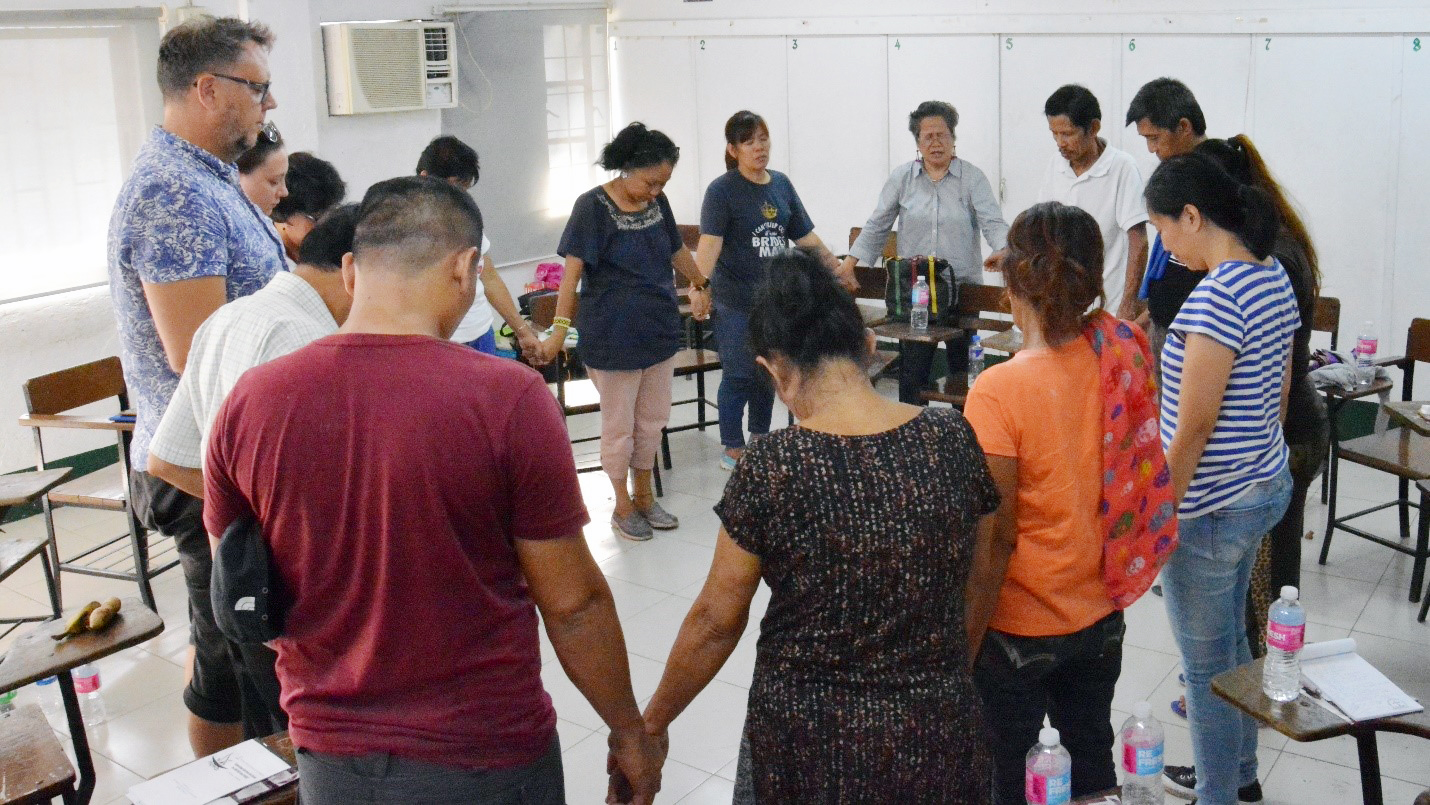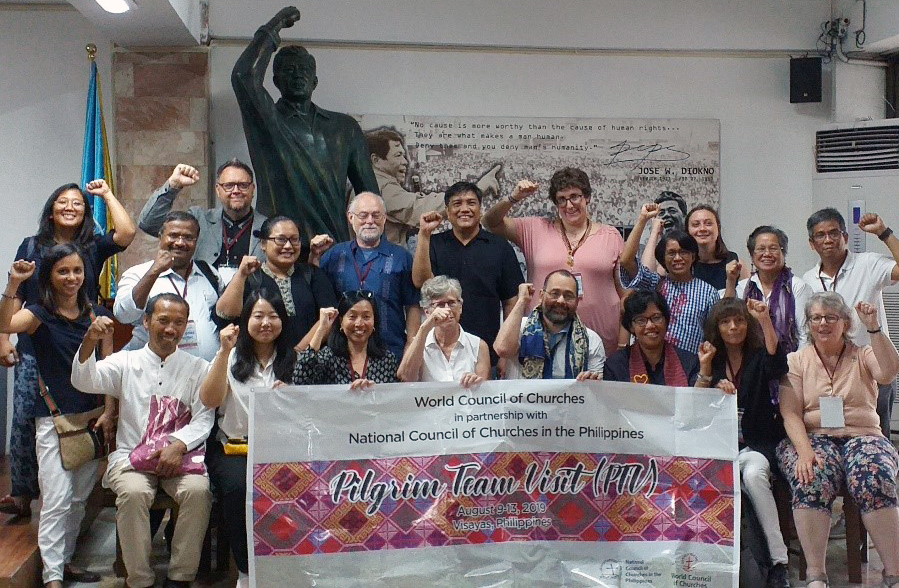Convened by the World Council of Churches in partnership with the National Council of Churches in the Philippines, Council for World Mission (CWM) was part of a Pilgrim Team Visit (PTV) to the Philippines from 9 to 13 August 2019. The 14 church leaders and activists, made up of women, men and youth coming from Canada, India, Indonesia, Singapore, South Korea, Switzerland, Taiwan, Thailand, the United Kingdom and the United States had embarked on this journey to listen, learn and bear witness to the escalating human rights crisis in the country.
Traveling by plane, jeep, boat and on foot, the pilgrims visited an urban poor settlement in Metro Manila and a key site for the “war on drugs”, peasants struggling for land rights in Cavite and Negros, Indigenous Dumagat communities resisting a hydroelectric dam project and Lumad communities displaced from their resource-rich ancestral domain.
In Navotas City, home to the third largest fishing port in Southeast Asia, a team of pilgrims heard from mothers and families of victims of extra-judicial killings in President Rodrigo Duterte’s bloody drug war. A mother recalled her son, affectionate and generous with his hugs. He had just returned from the port when 10 policemen came and shot him dead in his own house. A daughter spoke of her father, proud of all the tattoos he was covered in, yet scared of hospital needles. He was abducted along with his wife in front of their children and later found murdered in a cemetery; his wife turned up dead beneath a bridge. A father shared about his son who always came back from the port with fish to cook for breakfast and who would lovingly clean his father’s motorbike. One evening the police came and took him away and a few hours later, he was found in the street, bound in electric wire and shot in front of neighbours.
 The “war on drugs” has illegally claimed thousands of lives since President Duterte came to power in 2016 and has gained considerable international attention, culminating in the recently released United Nations Human Rights Resolution No. 41/2 which calls for an investigation in the spate of murders. But the killings and other human rights violations have expanded and have gone beyond so-called drug addicts and dealers in the cities. The most recent Global Witness Report points out that the Philippines is now the most dangerous place to be an environmental defender and land rights activist; and church workers and priests serving impoverished, rural and Indigenous communities have also become victims of violence and impunity. As one pilgrim put it, ‘How can these people be treated as enemies of the state? These are precisely the future of the state, they are farmers, young people, activists and indigenous people, they are the ones who offer the Philippines hope, not the violent outbursts and outrages of the Duterte government’.
The “war on drugs” has illegally claimed thousands of lives since President Duterte came to power in 2016 and has gained considerable international attention, culminating in the recently released United Nations Human Rights Resolution No. 41/2 which calls for an investigation in the spate of murders. But the killings and other human rights violations have expanded and have gone beyond so-called drug addicts and dealers in the cities. The most recent Global Witness Report points out that the Philippines is now the most dangerous place to be an environmental defender and land rights activist; and church workers and priests serving impoverished, rural and Indigenous communities have also become victims of violence and impunity. As one pilgrim put it, ‘How can these people be treated as enemies of the state? These are precisely the future of the state, they are farmers, young people, activists and indigenous people, they are the ones who offer the Philippines hope, not the violent outbursts and outrages of the Duterte government’.
A group of pilgrims traveled to Negros, the fourth largest island in the Philippines and home to sprawling haciendas or plantations that turn out around 54% of the sugar produced throughout the country. The island has seen a rash of killings in the past year, the majority of them farmers, but also human rights lawyers, a former major, a city councilor, a village chief, and a school principal. In sharing with the pilgrims, one of the survivors recalled the fateful day of the Sagay massacre last 20 October 2018. “That day we had just started to plant corn, monggo and bananas on three hectares of leased land so that our families would have something to eat in the dead season (for sugarcane planting), and that very night they shot nine of us. Two of us escaped because we were charging our cellphones in a hut close by. We heard the gunshots and hid in the fields. We reported the incident to the police as soon as we thought it was safe, but later we found out we had been charged with the murders. Why would we kill our own companions and relatives?” Seven of the nine who were killed were sugarcane workers struggling – against big plantation owners – for the right under the government’s agrarian reform programme to own the land they had been tilling for decades. The pilgrims felt rage and fear, “This is systematic violence and oppression, how can you get justice for your loved one when it is the police, it is the system that ordered and oversaw their murder?”
 Traversing mountains and rivers to reach the border of Rizal and Quezon provinces in Luzon, the biggest island in the Philippines, a team of pilgrims listened to the story of the Dumagat Indigenous Peoples who are fighting against recurrent proposals to reroute rivers and construct a hydroelectric dam on their land. With quiet dignity, the kapitan (local chief) shared the main fears of the Dumagat people: displacement from their ancestral land and destruction of their beautiful habitat and traditional ways of living. They cannot be the people they are without their land. He said: “Land is the most important thing. It is life to us. If we say ‘no’, we could face violence and the dam project will continue anyway”. At the time of the visit, the community was discussing whether or not to give consent to the project. Yet already, the contract has been awarded to a foreign firm and preliminary construction and preparatory works were visibly underway.
Traversing mountains and rivers to reach the border of Rizal and Quezon provinces in Luzon, the biggest island in the Philippines, a team of pilgrims listened to the story of the Dumagat Indigenous Peoples who are fighting against recurrent proposals to reroute rivers and construct a hydroelectric dam on their land. With quiet dignity, the kapitan (local chief) shared the main fears of the Dumagat people: displacement from their ancestral land and destruction of their beautiful habitat and traditional ways of living. They cannot be the people they are without their land. He said: “Land is the most important thing. It is life to us. If we say ‘no’, we could face violence and the dam project will continue anyway”. At the time of the visit, the community was discussing whether or not to give consent to the project. Yet already, the contract has been awarded to a foreign firm and preliminary construction and preparatory works were visibly underway.
In Cagayan de Oro City, another team of pilgrims heard the plight of Indigenous Lumad communities in Mindanao who have already been pushed away from ancestral lands rich in precious metals and minerals, fertile soils, and hot springs which could be developed into geothermal energy. The island of Mindanao was put under martial law since 2017, deepening militarisation and counter insurgency actions that had been put in place to protect current and potential multinational investors especially in the extractives sector. Datu Reynaldo, one of the Lumad chiefs, shared that he refused to sign the document that will allow the military to take control of their land. Yet others have been forced to do so; and, worse, forced or bribed to fight against their own people. Lumad children heartbreakingly spoke about how their parents have been summarily executed and how their schools have been shut down by government authorities. Displaced from their homes, orphaned and school-less, there is no normalcy in their young lives. “As a young woman joining this pilgrimage, I just can’t believe that children and young people are the deliberate targets of this government. What can they possibly achieve through the despair and rage they are creating for today and the future?”
“It has been profoundly moving to witness the struggles of the community groups and activists we have met. I am humbled by the risks they have taken to meet us, and the hope they place in us to raise their voices for change. The staff of the NCCP show us who God’s people are called to be, indeed they embody human beings at their best in the face and firing line of those who embody its worst”.
Carrying these and many other stories with them, the participants of the Pilgrim Team Visit to the Philippines met with the Commission on Human Rights and at least one foreign mission. At the end of their visit, the pilgrims issued the following message:
“We lift up, reiterate and amplify the calls of the communities we visited:
For the international community
• to support and monitor the implementation of the UN Human Rights Council Resolution No. 41/2, which mandates a comprehensive review of the human rights situation in the Philippines.
For the Government of the Philippines
• to comply with the HRC Resolution No. 41/2 and open its doors to investigators, as well as to fulfil its human rights obligations towards the Filipino people
• to put a stop to the criminalisation, red-tagging, vilification, harassment and murder of farmers, Indigenous Peoples and human rights and ecological defenders, including church people; to address the culture of impunity; and to extend protection to human rights and ecological defenders
• to put a stop to the killings in relation to the “War on Drugs”, bring perpetrators to justice and to develop and pursue a more holistic approach to drug dependency and the poverty which drives it
• to end martial law in Mindanao and “state of emergency” declarations in other provinces which are pretexts for militarisation
• to halt militarisation and development aggression in Indigenous territories, to respect the rights and ancestral domains of Indigenous Peoples, to reopen Indigenous schools and allow Indigenous communities to go on with their daily lives
• to resume peace talks with the National Democratic Front of the Philippines and to free all political detainees;
• to address the roots of the escalating human rights crisis – landlessness and deep-seated poverty – through genuine land reform and other socio-economic reforms
For the global community of churches
• to raise these issues with their national governments with a view to sustaining the UN HRC investigation
• to build solidarity with and accompany churches and sisters and brothers in the Philippines in these difficult times.”
We are saying to the witnesses we have met, “We believe you. We believe in you and we will rise with you in your struggle for justice.”




